- Home
- Courtney Milan
After the Wedding Page 3
After the Wedding Read online
Page 3
“Is your business worth more than knowing that the Church of England is led by men of good character? I know Lassiter’s doing something. I even have some idea as to what it is—he has a little too much money, and he has explained it by claiming excessively lucky investments for too long.”
Adrian shook his head.
Denmore nodded, as if he heard everything Adrian wasn’t saying.
“I know it’s a great deal to ask of you. I know how lowering it must feel for you. But it’s no more than you ask of me. If I could diminish Lassiter’s influence, I could choose to lower myself and accept you.”
Accepting me is not lowering. Adrian took another deep breath. He loved his uncle. He loved his uncle. Still, sometimes he didn’t like him much. For a moment, his emotions rose in his throat.
Years ago, his mother had charged him with changing his uncle’s mind. To bringing him around to the cause. He has influence in the Church, she said, and think what it would mean if he used it properly.
Grayson openly scoffed at his uncle’s claims that someday he would acknowledge their branch of the family—Grayson, who had no trust any longer.
Adrian had always wanted to believe that his uncle—the uncle who had been so kind in private—could become the sort of man who would be kind in public, too. I told you so, he could hear Grayson saying, when he returned with this tale.
“I should hope,” his uncle said, “that you would love me as much as I have loved you.”
“I do,” Adrian said, annoyed, “but—”
But he didn’t have a good argument. Not the kind Denmore could listen to, at any rate. His love felt like a chain wrapped round his neck, yanking him in line.
“If you love me,” his uncle wheedled, “do this one thing for me. Not even for me. Do it for yourself. Do this one thing, and I’ll acknowledge you. I promise.”
“That’s—you should…” But Adrian knew there was no use arguing. There had never been any point in arguing.
Don’t tie these things together, Adrian wanted to say. It makes me feel sick.
But feeling sick was an emotion, not an argument. His uncle wouldn’t listen.
Don’t ask this of me. You’ve hurt me enough. Emotion, not argument.
Don’t use me this way. Don’t use me at all. He had no arguments, only emotions.
Adrian knew his uncle. If he said no now, his uncle would take it as proof that he had never wanted acknowledgement, not really. Adrian could remember lying in bed at the age of fifteen and dreaming that his uncle would take Evans aside and just tell him. Don’t treat him like that. He’s my nephew, not my charity case.
It hurt, what his uncle was asking of him. But Adrian had been hurt so little, and others had been hurt so much. If he could make a difference…
He wanted Grayson to know that people could change, that a little trust would not go amiss. Here was his chance to have that.
He would do anything for his brother. Even this.
“If I do this, you must promise not to back away. Not this time.”
“Of course not.” The bishop looked utterly shocked. “I would never. It will be over before you know it, and we’ll greet the world with joy together.”
“Right.” The word tasted sour on Adrian’s tongue, but this was what he’d wanted. Recognition. Grayson. The part that hurt would be over soon enough, and once it was past, Adrian wouldn’t need to think of it again.
“Joy,” he said carefully. “I look forward to that.”
* * *
Adrian had to tell Grayson something, he thought. Something…short.
Eventually he settled on sending him a letter, one with no return address.
I will be a while, he wrote. A week, possibly more. Will return to Harvil after to finish the designs. I’ll explain when it’s all finished.
He did not know how to end his missive; anything he could add sounded foolish.
Don’t tell me so yet, he finally wrote. Not until all is said and done. It will all turn out beautifully, I’m sure.
He wished he felt as sure as he pretended. He provided no return direction. He didn’t want Grayson to know what he was doing, after all.
To Mr. Alabi at Harvil Industries, he sent another letter: Another business matter has arisen. You all have never needed me anyway. We’ll finalize designs when I arrive in two weeks. There won’t be a moment to spare. Thanks for your understanding.
And that was how it started for Adrian, the week before the wedding—with a mistake and a promise.
Chapter Three
For Camilla, it started three days before the wedding—on a Monday, with another mistake.
It was already half-two, and it would have been nice if someone had told the household staff that guests would be arriving that day. Warning given a week ago would have been preferable; even notice provided yesterday would have been acceptable. For God’s sake, a hint this morning at breakfast would have been better than what had actually happened, which was that the carriage pulled up outside just as Camilla was serving pudding at lunch.
Rector Miles had jumped up from the table. “Right!” He’d smiled broadly. “Bishop Lassiter is here now. Is everything in readiness?”
Nothing had been in readiness.
The sheets in the spare room had not been aired; no particular plans had been laid for supper except a course of roast chicken and rolls. The household had erupted into chaos, and Camilla had not had a moment to think in the time that followed.
“Camilla,” Kitty was saying as Camilla dashed up the stairs, staggering under her load of linen. “Camilla, why are the extra servants’ beds not made up yet? I asked you three hours ago.”
Kitty was not the housekeeper. She was just another maid-of-all-work like Camilla. But she had been around longer than Camilla, and so took it upon herself to order Camilla about when she had the chance.
“Because they’re not,” Camilla answered shortly. “But they will be.”
“See that they are. Then come help me polish the silver. It’ll be needed for tonight. Think how it will reflect on us if so much as a single fork has spots.”
“It won’t.”
“Pardon?”
“It won’t.” Camilla popped the door to the male servants’ room open with her hip. “It won’t reflect. If there’s spots? There will be no reflection?”
No response. Thank God Kitty had not heard that dubious attempt at humor.
Camilla shook out a sheet and wrangled it into place with a practiced air. When she’d been young and in an entirely different situation, she’d dreamed of marrying well and running a household far larger than this one. That had obviously not happened, and there was no point looking back to bemoan could-have-beens. But she could put on a square sheet, tight and perfect, in forty seconds flat. It wasn’t much to be proud of, but then, Camilla found her pride where she could. It was nice to be good at something.
She reached for the second sheet.
“Camilla!” Cook’s call drifted up the servants’ stairs. “Camilla, you’re needed now. Someone must bring the tea in for the bishop, and you’re the only one with the manners for it.”
“One minute!” She shook out her sheet.
“No minutes! Now!”
Sheets. Silver. Serving. All of which had to be done now, because the rector hadn’t had the decency to inform his staff of an impending visit.
Camilla slammed the sheets down and growled. “I don’t have time for this shite.”
“Who does?”
It was an amused voice behind her, an unfamiliar voice. A man’s voice—and since this was the male servants’ room, perhaps she should not have been so surprised. Still, she jumped, startled.
The man who stood in the doorway was utterly striking. He was tall and dressed in dark blue with contrasting crisp white linen. He was African—or, no, probably not that, Camilla amended, thinking of his voice.
He’d sounded very British. Just two words, and she could hear a hint of West Country i
n his accent. Those vowels reminded her of the years she’d spent in Bath when she was fifteen. The other girls had laughed at her then, saying Camilla was putting on airs with her language. She had tried to sound like them. When Camilla had been dragged to the other side of the country after that, her new compatriots had laughed at her and told her she sounded like a country bumpkin.
This man just sounded friendly. He was watching her with a smile.
Funny, how much more striking that contrast of crisp linen was with his brown skin than it would have been for a white man. He made everyone else seem utterly pallid by comparison.
She’d seen black people before—servants and sailors and speakers. She’d never cursed in front of one until now. Camilla had always blushed easily; she felt her cheeks flame. How utterly uncouth he must think her.
“I—” She swallowed. “Just now, you may have heard, ah—”
He looked visibly amused. “I’m absolutely positive that I heard you say, ‘I don’t have time for this trite…’” He trailed off, gesturing.
She couldn’t help herself. It was just a little kindness, to pretend he hadn’t heard her, but little kindnesses were still kindness. She couldn’t help herself; she smiled. “Oh, is that what I said? Of course. I don’t have time for this trite… But now I’m confused. That’s not a complete sentence. This trite what?”
“You didn’t say.” Maybe it was because his eyes sparkled. Maybe it was because Camilla had always bloomed under any sort of attention. Maybe it was because she’d been working furiously without so much as a half-second to breathe for the last hour. But she found herself blushing. Again.
“That doesn’t sound much like me.” She met his eyes, aware that speaking like this was a bit too forward. She was too tired to care. “I’ll have you know that I usually end my sentences with nouns when it’s called for. You must think me entirely ungrammatical. We can’t have that.”
“Ah.” He shrugged. “I assume you would have finished what you were saying had I not interrupted you. The fault is all mine.”
“If you had not interrupted me,” Camilla continued, “you would have heard me say, ‘I don’t have time for this trite bullshit.’”
Uncouth, forward, impatient—everyone always counseled Camilla to hide what she was. She’d never been able to do it properly. If this man hated her, best he discover it quickly—before her imagination caught fire and she let herself get hurt with her own expectations.
But instead of backing away, he actually laughed at this, his eyes crinkling up in a way that made her smile back at him.
“If you haven’t guessed from Cook’s shouting,” she said, “I’m Camilla. That’s Miss…” Worth, she did not say. It had been more than a year since she introduced herself by her real name. She couldn’t be Camilla Worth anymore; Camilla Worth would be an embarrassment to her family. “…Winters,” she finished. “Miss Winters to you.”
“Mister…” He paused, imitating the way Camilla had drawn out her fake name. “Hunter, His Grace’s valet.”
A valet. To a bishop. Well above her current station, she reminded herself, and she had best remember not to be foolish. She really needed to get away before Mr. Hunter made her smile again.
But—“I look forward to speaking with you,” he said, and he sounded as if he meant it.
Camilla always got carried away with herself. It was her worst flaw in what was undoubtedly an unending sea of unmendable flaws. She wanted so badly to be wanted. She’d been told again and again to stop, to have some decorum, and she rarely managed it. Likely she never would.
There was nothing particularly appreciative about the glances Mr. Hunter gave her; she should not allow herself to imagine that his gaze actually lingered on her. For heaven’s sake, she was the only thing in the room. What else was he to look at?
Still, he smiled at her one last time, and she couldn’t help but smile back. He was a valet to a bishop. That put him far above her station, and he was too handsome for her anyway. Besides, how long would he stay? Days, at best.
It was foolish to imagine that a little conversation was akin to flirtation. But Camilla had been foolish before.
Her glance, she knew, was possibly a little too familiar. “Unlikely. We’ll never speak again. I will perish from overwork before we have a chance to exchange another word.”
There it was again. She was flirting.
“I’ll be back to finish the sheets,” she said, because talking of beds would definitely make the situation better. “When I die, make sure that Kitty gets my wire brooch. She’s admired it so.”
“I’ll make up the beds.”
“You’re too kind. I’ll—”
“No,” he said with a twinkle in his eye, “you don’t understand. If you perish, I’ll have to get the bishop’s formal blacks ready for the funeral. It’s far less work to just finish the sheets.”
He wasn’t flirting, she reminded herself firmly. That sparkle in his eyes didn’t mean anything.
“In that case,” she said, “I’ll leave you to it, and maybe we can have that word later.”
He smiled. “Maybe we can.”
God, Camilla was an idiot.
She had a moment to look up, dazedly, into his eyes. They were brown, flecked with gold, and when he smiled, it felt as if the whole world was smiling with him. Idiocy.
It took a particular sort of perverse obstinacy to fall in love at first sight. It took absolute pig-headedness to do it again and again and again. To imagine affection from nothing and then hope for it repeatedly.
It was, in short, Camilla’s usual rebelliousness—to believe, after all this time, that someone would like her. It wasn’t the first time she’d been taken with someone simply because he was kind and handsome and a stranger.
None of the people familiar with her liked her at all. It would have to be a stranger who decided she was worth something, if it were ever to happen. And it had been so long, her chance had to come up—
“Camilla! Tea! Now!”
The shriek up the stairs jolted her out of her state of daydreaming. Camilla jumped and ducked her head. “I’m—that is—”
“Goodbye, Miss…Winters,” he said softly.
She shouldn’t. She really should not. “Au revoir, Mr…Hunter.” She could not help her hopeful smile, the lift in her heart. She could not help grinning as she ran down the stairs.
He was only going to be here for a short time. Then he’d leave. Besides, if he was employed by a bishop, he had to have an impeccable character.
She was flighty, flirty, and terribly good at fooling herself. Camilla knew this about herself. She’d learned it all too well. But a few hours, maybe a few days.
How could it hurt her to be happy for a few days?
* * *
Five minutes later, Camilla ducked into the rector’s office, where the two men were ensconced deep in conversation.
Summer sun was shining through the window, laying a cross-hatched pattern on the surface of Rector Miles’s desk. She set the large tray there, then gathered up the teapot.
“As far as charity works for the parish,” Rector Miles was saying, “I honestly cannot imagine doing more than we are doing at the moment.”
Camilla did not think much of the rector’s plans for charity. It was flaw number forty-nine in her, she supposed—a tendency to judge others when she had more than her own share of defects to correct. She tried not to judge—a little bit—but alas.
That would no doubt be engraved on her tombstone: Camilla tried to be good, but not for very long.
It was particularly hard for Camilla not to judge Rector Miles on the matter of charity, though. She and Kitty were both his charity projects, and while she did see some charity in his actions, she was still essentially an underpaid servant. She knew she should to be grateful to him, but…
“No,” the bishop replied. “I’ve seen what you do, and there is no benefit in devoting any more funds to the matter.”
Camilla was
grateful to Rector Miles. She was. She had been in trouble when he rescued her. He’d made her see all the possible consequences of her behavior. He’d taken her in, and he patiently spent time thinking of her.
No point returning to what she had been. She’d made a mistake—several mistakes—but she was trying to do better. She’d focus on that.
“Then we are agreed.” The two men nodded at each other.
Camilla set spoons and saucers down, aligning them precisely, then arranged the little ceramic dishes of milk and sugar between them.
It had not been trouble trouble that the rector had saved her from. At least, it had not been immediate danger. Just the kind that put her immortal soul in peril, even if it had made her mortal being temporarily happy.
“I’ve been thinking of the best way to handle the situation,” Rector Miles was saying. “It could potentially become a larger issue.”
Mr. Hunter had seemed kind. Just thinking of a man’s shoulders could not endanger her mortal soul, could it? They were just shoulders. Shoulders were above the waistline. Far above the waistline. Surely it would be entirely innocent to think of them. Would it not? Camilla fetched the sugar biscuits and set them above the tea things.
“And here I thought the matter was already decided,” the bishop said.
The tea-tray had been laden with treats today, but who had put it together, Camilla didn’t know. One didn’t serve sandwiches tossed higgledy-piggledy on a plate to a bishop. She shook her head and arranged them into a spiraling star.
The bishop was right, even if he hadn’t been addressing Camilla. She’d already made her decision. She was trying to be good. She didn’t want to have to think of her mistakes, and that meant no flirtations. No shoulders. No nothing.

 Her Every Wish
Her Every Wish Midnight Scandals
Midnight Scandals After the Wedding
After the Wedding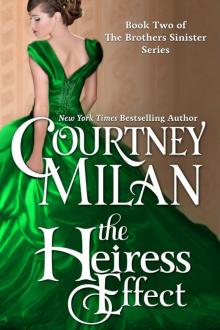 The Heiress Effect
The Heiress Effect Unraveled
Unraveled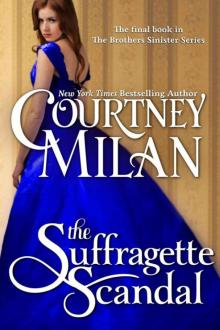 The Suffragette Scandal
The Suffragette Scandal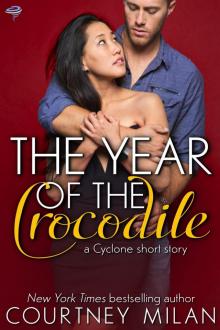 The Year of the Crocodile
The Year of the Crocodile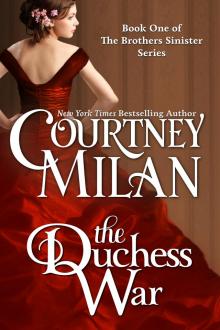 The Duchess War
The Duchess War What Happened at Midnight
What Happened at Midnight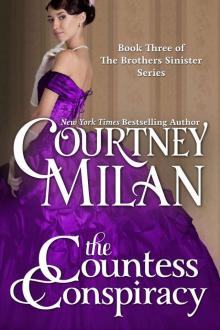 The Countess Conspiracy
The Countess Conspiracy Proof by Seduction
Proof by Seduction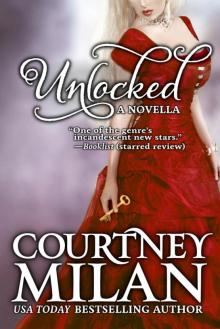 Unlocked
Unlocked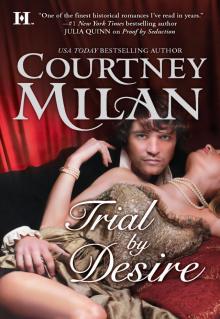 Trial by Desire
Trial by Desire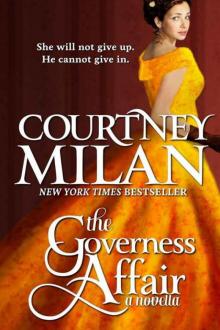 The Governess Affair
The Governess Affair Unveiled
Unveiled The Lady Always Wins
The Lady Always Wins Trade Me
Trade Me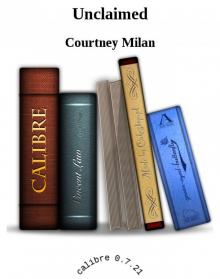 Unclaimed
Unclaimed This Wicked Gift
This Wicked Gift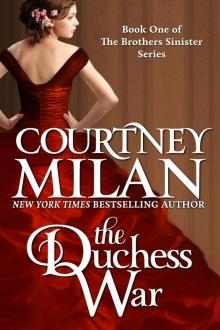 The Duchess War (The Brothers Sinister)
The Duchess War (The Brothers Sinister) Hamilton's Battalion: A Trio of Romances
Hamilton's Battalion: A Trio of Romances The Turner Series
The Turner Series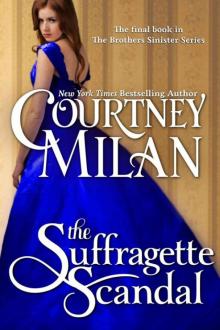 The Suffragette Scandal (The Brothers Sinister)
The Suffragette Scandal (The Brothers Sinister)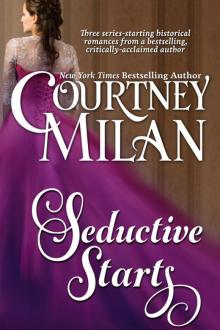 Seductive Starts
Seductive Starts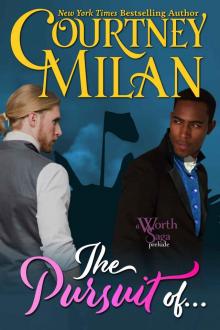 The Pursuit Of…
The Pursuit Of… Hamilton's Battalion
Hamilton's Battalion The Carhart Series
The Carhart Series Seven Wicked Nights
Seven Wicked Nights This Wicked Gift (A Carhart Series Novella)
This Wicked Gift (A Carhart Series Novella)